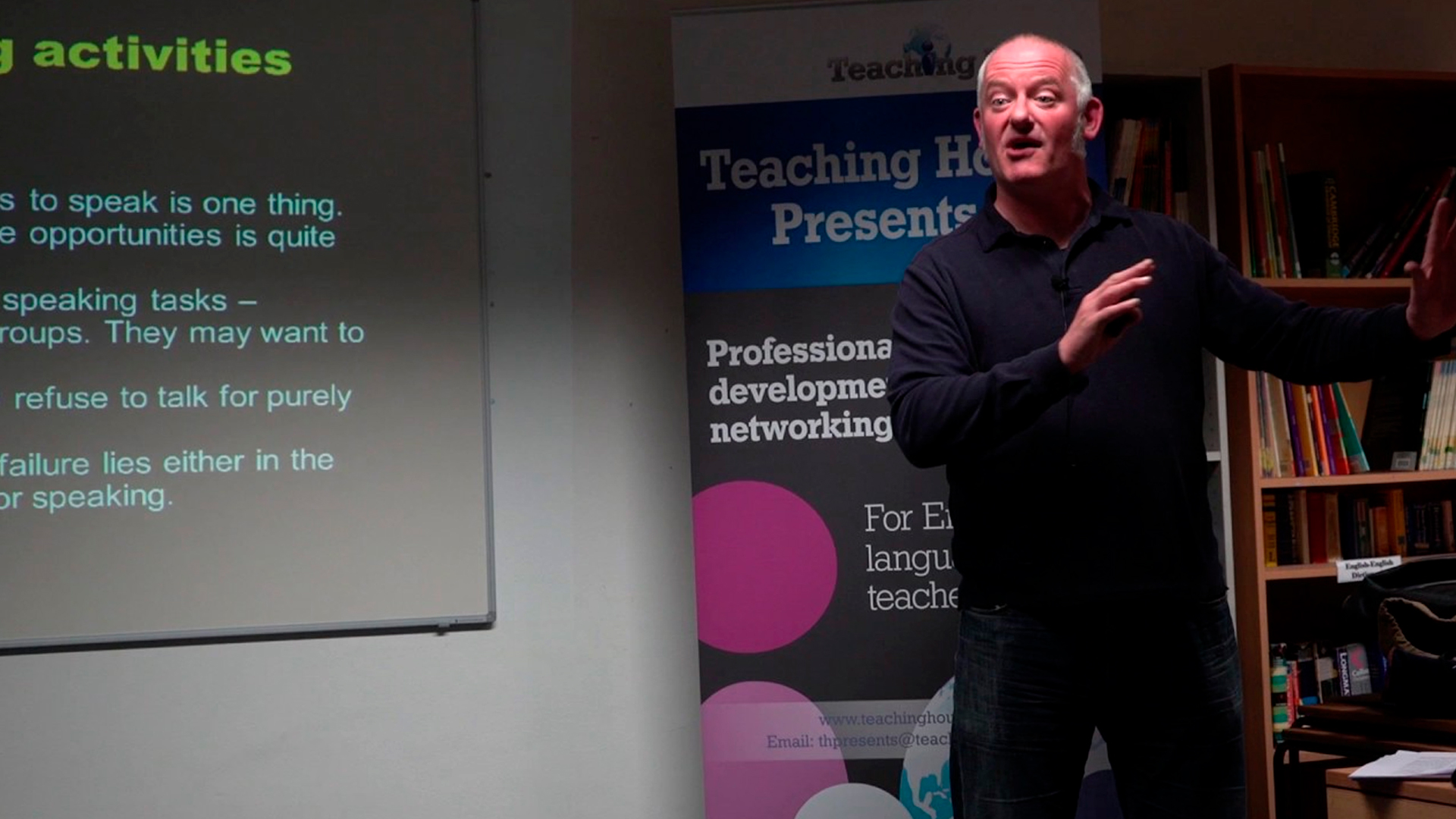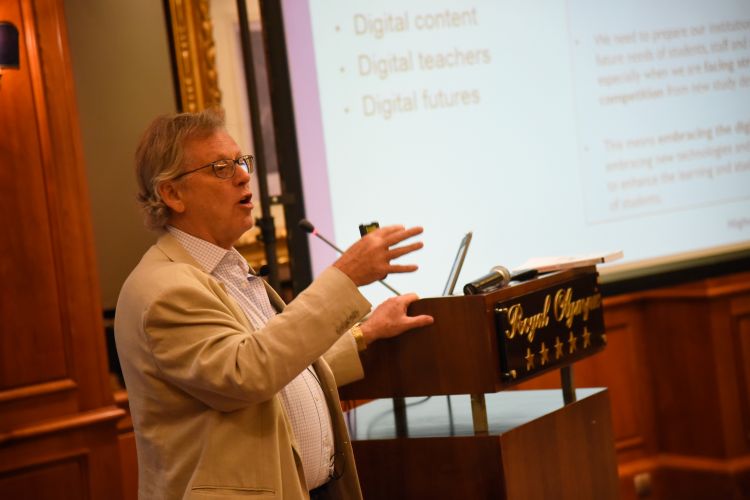Steve Taylore-Knowles has been involved in ELT for over two decades as a teacher, examiner, trainer and author. He holds BA (Hons) and MA degrees from the University of Warwick and is a Licentiate of Trinity College, London (Dip TESOL).
In the beginning of September, Steve was in Athens. He was a plenary speaker at the Foreign Languages Forum, where he discussed the role of technology in ELT. Additionally, he conducted a workshop on phrasal verbs and their use in teaching and learning.
- As an ELT author and consultant, what initially sparked your interest in the field of ELT, and how did you decide to pursue a career in this area?
I’ve always been interested in language and literature, and my first degree was in English and American Literature. After doing a Master’s degree in English Literature, I was considering an academic career when the opportunity to teach in Greece came up. Like many people, I thought it would be a temporary position for a year or two, but something about teaching and living in Greece got under my skin and I ended up doing a Dip. TESOL and staying for nearly 14 years before relocating to the UK.
- Could you share some insights into your work as a teacher trainer? What are some key principles or strategies that you emphasize when training teachers in the field of ELT?
When I talk to aspiring or new teachers about what happens in the classroom, I try to emphasise the importance of being learner-centred and flexible. Of course, having and following a lesson plan is important, but so is being open to the ‘teachable moments’ that come along in a lesson based on a particular group of students’ interests and needs. Students are not just passive participants waiting to have their heads filled with whatever the teacher (or coursebook writer!) has identified as the next bit of language in the syllabus. An effective teacher is always on the lookout for ways in which students can be given agency. One way is for students themselves to suggest topics or texts for the classroom. Another is to look for ways in which students can be given a choice of activity or ways in which they can personalise their learning.
- In your experience, what are some of the common challenges that English language learners face, and what approaches do you recommend for overcoming these challenges effectively?
Greek language learners are luckier than many learners around the world, since the English language itself doesn’t present as many difficulties to them as it does to, say, Japanese learners. Of course, the learners themselves might disagree! In terms of linguistic aspects of English, there are some that present particular problems, such as learning and using phrasal verbs. As I outlined in my recent workshop at the Foreign Languages Forum in Athens, I think in that particular case it’s useful to try to augment students’ memorisation efforts with an understanding of the underlying logic of phrasal verbs. They aren’t just random but can be categorised according to the different metaphorical meanings that the particles express. Another area of linguistic difficulty is the large variety of verb patterns that occur in English (deny doing, refuse to do, etc). Although a certain amount of rote learning is probably unavoidable, I think we can be creative in how we practise these, by getting students to include them in roleplays, stories, videos for social media, and so on.
- As a partner in Signature Manuscripts, could you tell us more about your role and the services provided by the organization? What do you find most satisfying about it?
We are what’s commonly known as a ‘packaging company’, although that description can cover a variety of different organisations. Publishers (and other clients) come to us when they need a new course or other materials and we help them develop the concept before putting together teams of editors and writers to produce the material under our supervision.
The most satisfying aspect of that side of my working life is the variety of projects that I get to work on and the different types of students I get to produce materials for. It’s fascinating to get deeply involved in the huge range of situations where people are learning English, from teenagers in Latin America to nurses in India, all with their own needs and perspectives. It constantly reminds me of the risks of generalising about learning English.
- What are some emerging trends or innovations in the field of ELT that you find particularly exciting?
This isn’t so much an emerging trend as a consolidating trend, perhaps, but the increasing focus on developing global skills (critical thinking, cultural awareness, problem-solving skills, interpersonal skills, etc) is a key part of where we are in ELT at the moment, and it’s something I welcome. We are moving away from seeing ‘learning a language’ as an activity that is isolated from the rest of a person’s life and recognising that it’s intimately connected to many aspects of who a person is. It recognises that we do things through language, and being able to do those things is more important than knowledge of the language in isolation. Connected to that, we’re also moving away from viewing the English language as a monolithic thing that belongs to or is somehow policed by native speakers. In fact, as my work focuses more on parts of the world with very complicated linguistic environments, I’m becoming less sure what exactly a ‘native speaker’ is!
- As an author, what is your creative process for developing engaging and effective ELT materials? How do you ensure that your materials cater to the diverse needs of English language learners?
Any materials have to rest on a secure foundation of the needs of the learners. An understanding of that comes from research, school visits and lesson observations, and talking to as many people with relevant insights as possible. Once you’ve got that understanding, then you can try to be creative within the parameters set by that. I’ve written a number of courses for teenagers and young adults, and I think one important aspect of producing engaging materials for those age groups is finding a quirky angle or an unusual take on a topic, particularly if you can give it a human face. That applies to glossy coursebooks with illustrated reading texts, of course, but it also applies to materials where you might not expect much life, like grammar practice material. There’s no reason why a simple cloze passage practising a particular grammar point can’t be brought to life with a little real-world content and, where appropriate, humour.
And if I want to include a particular TikTok star or Snapchat trend to give everything a contemporary feel, my young teenage daughter, Scout, is always a good sounding board!
- Collaboration and networking are essential in the ELT community. How do you engage with other professionals in the field, and what benefits do you believe these connections bring to your work?
I’m connected to other authors, teachers and trainers through social media, of course, and online groups are an excellent way of keeping abreast of your fellow professionals’ interests, concerns and challenges. But there’s nothing like face-to-face connections, and ever since I first joined TESOL Greece over twenty years ago and then served on the Board, I’ve encouraged teachers to seek out their local professional organizations and go along to in-person events. Of course, those kinds of events offer the opportunity to give a talk or a workshop for those who think they have something to say, and that can become an important part of some people’s professional development, but even if you don’t do that, they’re great for meeting other teachers, exchanging ideas and forming professional bonds. Now that I’m back in the UK, I try to attend IATEFL every year to see existing friends and colleagues, meet new people, and catch up with current ideas.
Those connections remind me that while every learner is unique, every teacher is unique, and every classroom is unique, we also have a great deal in common. They also sometimes lead to the next interesting project that I get involved in!
- In your opinion, what role does technology play in enhancing English language learning? Are there any specific digital tools or platforms that you find valuable for both teachers and learners?
Technology can be very useful, but the use of technology shouldn’t be an end in itself. I think we have to ask of any technology: what is it adding to the learning process? At the moment, I’m intrigued by how generative AI (programs such as ChatGPT, etc) can enhance teaching and learning. It’s still very early, but it looks like it may have a useful role to play for teachers in generating certain types of classroom material, or providing ideas and professional guidance. For learners, it has enormous potential in terms of providing a practice partner, explaining language points, and so on. However, there are also question marks around issues such as bias or information integrity. It’s certainly an area to keep a very close eye on.
- Can you share any memorable teaching or training experiences that have had a significant impact on your professional journey? What lessons did you learn from those experiences?
I’ll just mention two, which taught me the same lesson, once as a teacher and once as a writer. I had a First Certificate class with teenage students and we were discussing jobs, ambitions, etc., and we went round the class with everyone saying a job they might like to do in the future. One girl, a fairly strong student, said ‘English teacher’. I asked her why. She thought for a second and said: “Because of you.”
Some years later, I was in Argentina on a book tour. After one of the events, I was talking to a small group of young adults who were being trained to become English teachers. One of them, a young man who had made some interesting contributions during my talk, said that he had studied my courses in class throughout his secondary years, and he’d really enjoyed them, and now he wanted to be a teacher. I should add that his English was excellent!
The lesson I took from both those experiences is this: what you do makes a real difference. What you do in your classroom can inspire people. It might mean inspiring them to love English, to love learning and to go on to become English teachers, yes. But it might also mean inspiring them in lots of other ways. Teaching is an important thing to do.
- Lastly, what advice would you give to aspiring ELT authors, consultants, and teacher trainers who are looking to make a meaningful contribution to the field? What steps should they take to develop their skills and establish themselves in the ELT community?
It’s hard to say because people have such individual paths towards those kinds of position. Let me restrict my comments to becoming an ELT author. First of all, if you aren’t already doing so, produce materials for your own classroom. Experiment and figure out what works and what doesn’t, bearing in mind that published materials have to work in many different classrooms. As I said earlier, get involved in groups and organisations, both online and in the real world, and make contacts. Learn about the ELT publishing world by talking to people already in it. Be open to any opportunities that come along. You can only be in the right place at the right time if you put yourself in enough different places often enough!



